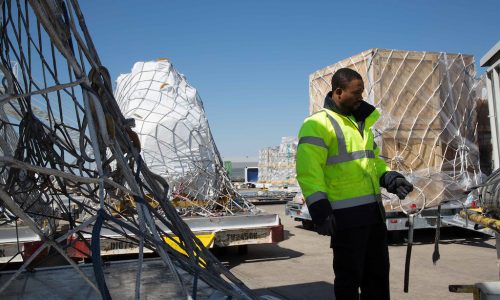Q3 2020 total Express volumes (International & Domestic) rose by 35% driven by healthy growth in e-commerce activities


Aramex announced its financial results for the third quarter ended 30 September 2020.
Aramex’s Q3 2020 Revenue increased by 19% to AED 1,507 million, compared to AED 1,270 million in Q3 2019. Top line rose across most of the Company’s business lines, with International Express rebounding from the previous quarter as global business activities have generally started to pick up with Covid-19 related lockdowns, mobility restrictions and border closures easing over the three-month period. Revenue for the nine-month period ending 30 September 2020 increased by 7% to AED 4,035 million, compared to AED 3,782 million in the corresponding period of 2019.
Net profit fell by 59% to AED 46.2 million in Q3 2020, compared to AED 113.8 million in the corresponding period of 2019. Excluding the previously announced non-recurring provision booked during the period because of the damages caused by two major incidents, namely Lebanon’s blast and the warehouse fire in Morocco, Net Profit would have been down by only 13% year-on-year to AED 99.1 million. Net Profit for the nine-month period decreased by 40% to AED 208 million compared to AED 344.94 million in the prior year period. Excluding the provision, nine months Net Profit would have been AED 260.89 million, a 24% decline from AED 344.94 million made in the same period last year.
More generally, to enable the Company to manage a robust increase in volumes, costs related to scaling operations rose over the period. Additionally, some cross-border costs including line haul rates remain high relative to their historical averages. Those costs have been pushed higher since the beginning of the Covid-19 pandemic.

Bashar Obeid, Chief Executive Officer of Aramex, said: “We witnessed a very strong set of results over the three-month period, achieving the highest Q3 revenue on record supported by growth across most of our business lines. Covid-19 has accelerated growth in the e-commerce industry, which remains the dominant driver of our top line growth. We also managed to capture new opportunities from other industries, namely healthcare and pharmaceutical as well as retail and food and beverage. This has enabled us to further diversify our revenue mix, which is a core part of our commercial strategy to ensure we continue to grow sustainably through various market cycles.
However, Covid-19 has also increased our overall operating costs across multiple parts of our business including costs related to scaling last mile operations and cross border transportation. While we believe the operating capital that has been deployed to expand our last mile capacity will normalize in the coming quarters, relatively higher line haul costs are here to stay for the foreseeable future. Moreover, given the increased price sensitivity of our customers, a trend which we have been experiencing over the last few years, our pricing strategy is to remain competitive while ensuring we continue to provide efficient and high-quality service.”
Othman Aljeda, Regional CEO for Aramex in Europe, North America and Asia, added: “We experienced an exceptional 35% growth in total volumes over the period, with the majority of the contribution coming from our core markets including Saudi Arabia and UAE. Over the period we continued investing in our last mile infrastructure to support the strong growth in e-commerce activities including hiring more couriers, increasing our fleet, expanding our warehouse capacity and upgrading our clearance gateway capabilities. We also invested in several IT solutions to help automate and digitize certain processes. These investments are crucial to ensuring we are in a stronger position to efficiently handle current and future higher volumes and improve our level of service to customers.”
Q3 2020 Business Performance Highlights:
Aramex’s cross-border International Express increased by 29% to AED 715 million and shipment volumes rose by 12% year-on-year and by 14% from Q2 2020. The majority of the growth has been coming from Asia and Europe origins into GCC markets. However, margins continue to be pressured because of Covid-19 induced higher operating costs.
The Domestic Express business grew by 29% to AED 350 million and e-commerce volumes in core markets surged 71% over the period with particularly strong contribution from Saudi Arabia and the UAE, in addition to Australia. This was driven by a very strong demand from e-commerce activities.
Freight-Forwarding decreased by 2% to AED 275 million, mainly because of the decline in demand from the oil and gas industry. However, this business line witnessed some good recovery in other industries such as retail and a considerable increase from the pharmaceutical and healthcare industries.
The Logistics & Supply Chain Solutions business rose by 6% to AED 94 million. This business line has recovered from Q2 2020 as regional retailers have witnessed a recovery in their sales activities since the loosening of Covid-19 lockdown measures and is also benefitting from solid growth from the healthcare industry. Of note, Aramex has made inroads into the food and beverage market and sees it as a growth market segment.
Commenting on Aramex’s outlook for the remainder of 2020, Bashar Obeid said: “For the upcoming holiday period we anticipate new and veteran online shoppers to turn to online channels to buy goods and send gifts to family and friends all over the world. As such, we expect healthy demand for our Express business, and we are confident that our operations and dedicated teams are well prepared to handle the expected surge in volume in a timely and efficient manner.
Separately, over the last several quarters, we have been executing on our digital transformation to help realize efficiencies and improve the level of service. We believe our efforts on that front are starting to bear fruit and will continue to reflect positively on our financial performance helping unlock more value to our shareholders in the quarters to come. We also believe the regions’ transportation, logistics and last mile delivery industry is ripe for consolidation and we are actively seeking potential opportunities that will realize synergies to enhance the sector’s efficiency, reliability and end-to-end service level.”

